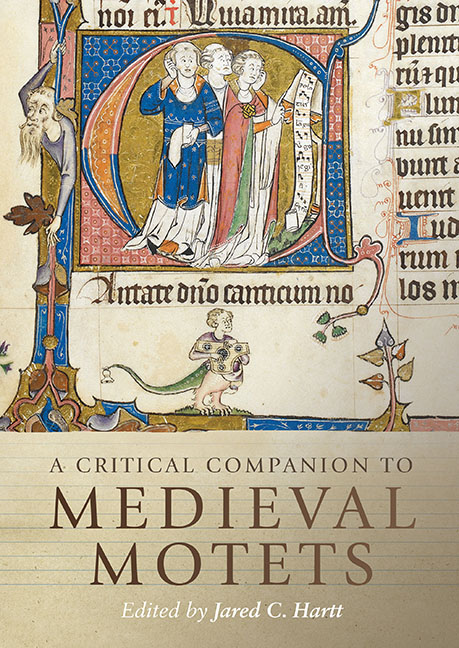Book contents
- Frontmatter
- Dedication
- Contents
- List of Figures
- List of Music Examples
- List of Tables
- List of Contributors
- Preface
- Acknowledgments
- Abbreviations
- Introduction: Approaching Medieval Motets
- 1 The Genre(s) of Medieval Motets
- 2 Origins and Interactions: Clausula, Motet, Conductus
- 3 Tracing the Tenor in Medieval Motets
- 4 Isorhythm
- 5 Notation
- 6 Thirteenth-Century Motet Functions: Views through the Lens of the Portare Motet Family
- 7 A Prism of its Time: Social Functions of the Motet in Fourteenth-Century France
- 8 Motets, Manuscript Culture, Mise-en-page
- 9 Clerics, Courtiers, and the Vernacular Two-Voice Motet: The Case of Fines amouretes / Fiat and the Roman de la poire
- 10 When Words Converge and Meanings Diverge: Counterexamples to Polytextuality in the Thirteenth-Century Mote
- 11 Motets in Chansonniers and the Other Culture of the French Thirteenth-Century Motet
- 12 Building a Motet around Quoted Material: Textual and Musical Structure in Motets Based on Monophonic Songs
- 13 The Duet Motet in England: Genre, Tonal Coherence, Reconstruction
- 14 Materia Matters: Reconstructing Colla/Bona
- 15 Machaut’s Motet 10 and its Interconnections
- 16 A Motet Conceived in Troubled Times: Machaut’s Motet 22
- 17 A Motet Ahead of its Time? The Curious Case of Portio nature/Ida capillorum
- Bibliography of Works Cited
- Select Glossary
- Index of Cited Motets
- General Index
- Studies in Medieval and Renaissance Music
17 - A Motet Ahead of its Time? The Curious Case of Portio nature/Ida capillorum
Published online by Cambridge University Press: 21 October 2020
- Frontmatter
- Dedication
- Contents
- List of Figures
- List of Music Examples
- List of Tables
- List of Contributors
- Preface
- Acknowledgments
- Abbreviations
- Introduction: Approaching Medieval Motets
- 1 The Genre(s) of Medieval Motets
- 2 Origins and Interactions: Clausula, Motet, Conductus
- 3 Tracing the Tenor in Medieval Motets
- 4 Isorhythm
- 5 Notation
- 6 Thirteenth-Century Motet Functions: Views through the Lens of the Portare Motet Family
- 7 A Prism of its Time: Social Functions of the Motet in Fourteenth-Century France
- 8 Motets, Manuscript Culture, Mise-en-page
- 9 Clerics, Courtiers, and the Vernacular Two-Voice Motet: The Case of Fines amouretes / Fiat and the Roman de la poire
- 10 When Words Converge and Meanings Diverge: Counterexamples to Polytextuality in the Thirteenth-Century Mote
- 11 Motets in Chansonniers and the Other Culture of the French Thirteenth-Century Motet
- 12 Building a Motet around Quoted Material: Textual and Musical Structure in Motets Based on Monophonic Songs
- 13 The Duet Motet in England: Genre, Tonal Coherence, Reconstruction
- 14 Materia Matters: Reconstructing Colla/Bona
- 15 Machaut’s Motet 10 and its Interconnections
- 16 A Motet Conceived in Troubled Times: Machaut’s Motet 22
- 17 A Motet Ahead of its Time? The Curious Case of Portio nature/Ida capillorum
- Bibliography of Works Cited
- Select Glossary
- Index of Cited Motets
- General Index
- Studies in Medieval and Renaissance Music
Summary
Portio nature/Ida capillorum/Contratenor/Ante thronum trinitatis presents modern scholars with a conundrum. Many aspects of the motet's advanced style and structure are at odds with the early date suggested by its text and attribution. Consequently, the work raises basic methodological questions: are we to trust extrinsic factors like source dating and compositional function even when they appear to contradict stylistic evidence? As with many fourteenth-century motets, the text of Portio/Ida contains an apparent clue to its origins. The motet is dedicated to St Ida of Lorraine (c.1040–1113), who, through her marriage to Eustace II, became Countess of Boulogne. The motetus text ends with a prayer for the soul of a certain ‘Henricus’, who names himself as the author of ‘this song and collection of words’. While the earliest sources lack an attribution outside the motetus poetry, one late source for Portio/Ida names two authors: ‘Magister Heinricus’ and ‘Egidius de Pusiex’. This has led scholars to suggest that Henricus was responsible only for the texts and Egidius for the music. The sources therefore seem full of identifying clues, especially when compared with anonymous pieces or those that have generic texts.
The connection between ‘Egidius de Pusiex’ and Portio/Ida is found only in Coussemaker's 1866 transcription of a now lost source, Str: ‘Magister Heinricus’ appears in the center head of the page, in the same space Coussemaker indicated the composer of other pieces, and ‘Egidius de Pusiex’ is written slightly smaller and off to the right. In trying to identify this Egidius, Suzanne Clercx and Richard Hoppin propose ‘Egidius de Puiseus’, chaplain for Hughes Roger de Beaufort, Pope Clement VI's nephew. This identification would place the motet's origin at the Avignonese papal court. St Ida was never a widely venerated saint, certainly not beyond Boulogne and Calais, so how did she become the subject of a motet written more than two hundred years after her death? Surely she would have had special significance for the motet's commissioner. Her most prominent descendant in the Avignonese retinue was Cardinal Guy of Boulogne – Ida's great grandson seven times over.
- Type
- Chapter
- Information
- A Critical Companion to Medieval Motets , pp. 341 - 354Publisher: Boydell & BrewerPrint publication year: 2018



